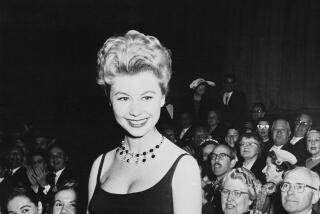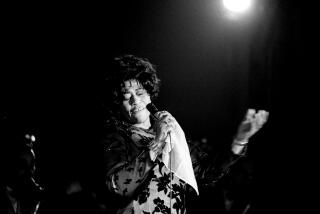Ellie Greenwich dies at 68; co-wrote ‘Da Doo Ron Ron,’ ‘Chapel of Love’ and other ‘60s hits
- Share via
Ellie Greenwich, the New York songwriter behind a string of 1960s hits that gave effervescent voice to unbridled teen romance including “Da Doo Ron Ron,” “Chapel of Love” and “Be My Baby,” many of them in collaboration with producer Phil Spector, died Wednesday of a heart attack, according to her niece, Jessica Weiner. She was 68.
She was being treated for pneumonia and “some other heart issues” at St. Luke’s- Roosevelt Hospital Center in New York when she suffered the heart attack, Weiner said.
“She was the greatest melody writer of all time,” Brian Wilson told The Times on Wednesday. The chief creative force of the Beach Boys, whose music was strongly influenced by many of the hits Greenwich and her husband Jeff Barry wrote with Spector, has often cited “Be My Baby” as his favorite record of all time.
FOR THE RECORD:
An earlier version of this story included an incorrect word in the lyrics for “Do Wah Diddy Diddy.” The correct line is “There she was just walkin’ down the street,” not “There she goes just walkin’ down the street.” —
“Those songs are part of the fabric of forever,” said songwriter Diane Warren, whose compositions have been recorded by Aretha Franklin, Celine Dion, Barbra Streisand, Whitney Houston, Mary J. Blige and dozens of others. “Her songs were written in the ‘60s, and it’s 2010 almost, but they are as relevant and meaningful today as the day when they were born. “
Greenwich and Barry were part of the fabled Brill Building stable of professional songwriters that also included the teams of Hal David and Burt Bacharach, Carole King and Gerry Goffin, Barry Mann and Cynthia Weil as well as Paul Simon, Neil Sedaka and Neil Diamond.
Greenwich also broke ground as one of the first female record producers, working with Barry in crafting Diamond’s early recordings, including “Cherry Cherry,” “Solitary Man” and “ Kentucky Woman.”
Diamond had struggled as a songwriter until he came under the wing of Greenwich and Barry, who’d already logged numerous shimmering pop hits for groups such as the Ronettes, the Crystals, the Dixie Cups and Ronnie Spector.
After recording some demos of his songs with Greenwich supplying backup vocals, Diamond recalled her telling him, “ ‘I think you’re pretty good -- maybe you’d like to meet my husband, and we could sit and talk.’ . . . They got me a contract, as a writer with [Jerry] Leiber and [Mike] Stoller’s Trio Music.”
The songwriting-production team of Leiber and Stoller, who had written many of Elvis Presley’s hits and dozens of other chart-topping ‘50s songs, had been impressed with Greenwich’s songs and brought her into their company.
“The songs that they wrote were simple but very wonderful,” Stoller said Wednesday. “She was very gifted at writing that kind of a song. She was just terrific.”
Their collaborations with Wall of Sound creator Spector are regarded among the greatest singles ever created. The music publishing rights organization Broadcast Music Inc. lists more than 200 songs she wrote or co-wrote, including “Then He Kissed Me” (the Crystals), “I Can Hear Music” (The Ronettes, Beach Boys), “Hanky Panky” (a hit for Tommy James & the Shondells), “Maybe I Know” (Lesley Gore) and the song Spector considered his greatest recording, “River Deep, Mountain High” (Ike and Tina Turner).
Greenwich has said that the title phrase of “Da Doo Ron Ron” was never intended to be part of the song; it was improvised as a nonsensical space filler until she and Barry could come up with a real line to follow the tune’s opening lyric: “I met him on a Monday and my heart stood still.”
“We got all the rest of the words and music together, but we couldn’t find anything for this bit,” she said in 2005. “Believe me, it doesn’t mean a thing.” On the other hand, when she and Barry wrote “There she was just a walkin’ down the street” to start another song, she responded with what she imagined a young girl skipping down a street would sing: “Do wah diddy diddy dum diddy do.” “Do Wah Diddy Diddy” became a No. 1 hit in 1965 for the British group Manfred Mann.
Eleanor Louise Greenwich was born Oct. 23, 1940, in Brooklyn, N.Y., to a Catholic father and a Jewish mother. They moved to Levittown, Long Island, when she was about 11, and she began studying accordion before switching to piano.
She enrolled at Queens College when she was 17 and in 1958 released a single with two songs she had written, “Silly Isn’t It” and “Cha-Cha Charming.” She transferred to Hofstra University, where she met Barry. She graduated in 1962, and married Barry the same year.
Their common interest in music also gave birth to a songwriting team. On a visit to the Brill Building, she was plunking out notes on a piano while waiting to meet with another writer, and Leiber looked in thinking he was hearing Carole King. Greenwich introduced herself, showed off some of her songs and soon Leiber and Stoller offered her a songwriting contract at Trio Music.
She and Barry recorded a few songs as the Raindrops, but their biggest hit reached only No. 17, “The Kind of Boy You Can’t Forget.”
Leiber and Stoller also had been working with Spector, who clicked with Greenwich and Barry and crafted many of his biggest successes with their help.
We just got Phil,” she said in 2001. “We made him laugh. And we understood him. We accepted his idiosyncrasies. . . . I think he just felt safe with us. Plus, we turned out some really good stuff.”
Greenwich suffered a nervous breakdown after she and Barry divorced in 1965, and the hits stopped flowing. The public’s attention was shifting to the Beatles and other British invasion bands as well as a rising crop of self-contained singer-songwriters such as Bob Dylan, putting many Brill Building pros out of work.
“When my marriage fell apart and my style dropped out of fashion, it seemed there wasn’t anything left,” she told an Australian newspaper in 2005. “It’s easy to say I had plenty left, but that’s not how it seems when you’re there.”
In the ‘80s she created a musical titled “Leader of the Pack” that included many her pop hits and told the story of her rise to fame and equally steep fall. She bounced back with new songs, and scored Tony and Grammy Award nominations for her show.
As recently as 1997 one of her songs, “The Sunshine After the Rain,” became a dance-pop hit in England and Australia. Cyndi Lauper, Nona Hendryx and Desmond Child were among artists who recorded her compositions in recent years.
Greenwich is survived by her sister, Laura Weiner. Services will be private.
More to Read
Start your day right
Sign up for Essential California for the L.A. Times biggest news, features and recommendations in your inbox six days a week.
You may occasionally receive promotional content from the Los Angeles Times.






